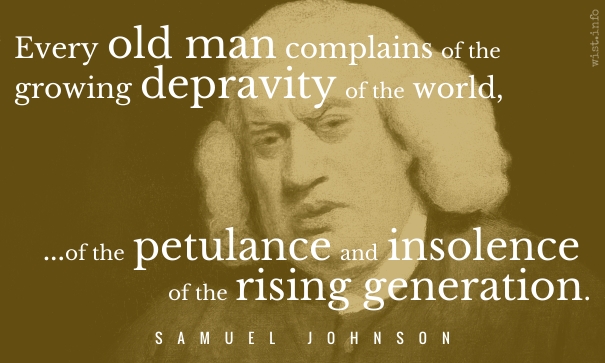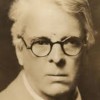What a contrast to this civil war in our midst! Here, set deep inside the country, are conspiracy, danger and a deadly foe. Degeneracy, madness and evil are the enemies we have to fight.
[Domesticum bellum manet, intus insidiae sunt, intus inclusum periculum est, intus est hostis. cum luxuria nobis, cum amentia, cum scelere certandum est.]
Marcus Tullius Cicero (106-43 BC) Roman orator, statesman, philosopher
Orationes in Catilinam [Catilinarian Orations], No. 2, ch. 5 / § 11 (2.5.11) (63-11-09 BC) [tr. Grant (1960)]
(Source)
Cicero argues that, having achieved peace with other nations, the danger to Rome is now the internal one of Catiline and his decadent, wastrel followers.
(Source (Latin)). Alternate translations:
The Plot is within; the danger locked within; the Enemy is within: We have a Conflict with Luxury, with Madness, with Treachery.
[tr. Wase (1671)]
Our only danger is at home; treason lurks within our walls; the enemy is in the heart of the city. Luxury, villainy, and madness, are the foes we are to encounter.
[tr. Sydney (1795)]
Domestic war alone remains. The only plots against us are within our own walls, -- the danger is within, -- the enemy is within. We must war with luxury, with madness, with wickedness.
[tr. Yonge (1856)]
A war at home remains; the snares are within; the danger is inclosed within; the enemy is within; we have to contend with luxury, with madness, with guilt.
[tr. Mongan (1879)]
A domestic war remains; the snares are within; the danger is inclosed within; the enemy is within; it is to be contended to (by) us with luxury, with madness, with crime.
[tr. Underwood (1885)]
A domestic war remains; the ambuscades are within; the danger is enclosed within; the enemy is within; (it) is to [must] be contended by us [we must contend] with luxury, with madness, with crime.
[tr. Dewey (1916)]
The enemy is within the gates; it is with our own luxury, our own folly, our own criminality that we have to contend.
[tr. Taylor (1916)]
Quotations about:
decadence
Note not all quotations have been tagged, so Search may find additional quotes on this topic.
Tolerance and apathy are the last virtues of a dying society.
Aristotle (384-322 BC) Greek philosopher
(Spurious)
Not found in the writings of Aristotle, or, with variation, anywhere early than the 19th Century. More discussion of this quotation's origins and misuses:
Why, pray, should I speak of things which are incredible except to those who have seen them, that a host of private men have levelled mountains and built upon the seas? To such men their riches seem to me to have been but a plaything; for while they might have enjoyed them honourably, they made haste to squander them shamefully. Nay more, the passion which arose for lewdness, gluttony, and the other attendants of luxury was equally strong; men played the woman, women offered their chastity for sale; to gratify their palates they scoured land and sea; they slept before they needed sleep; they did not await the coming of hunger or thirst, of cold or of weariness, but all these things their self-indulgence anticipated.
[Nam quid ea memorem, quae nisi eis qui videre nemini credibilia sunt, a privatis compluribus subvorsos montis, maria constrata esse? Quibus mihi videntur ludibrio fuisse divitiae; quippe quas honeste habere licebat, abuti per turpitudinem properabant. Sed lubido stupri, ganeae ceterique cultus non minor incesserat; viri muliebria pati, mulieres pudicitiam in propatulo habere; vescendi causa terra marique omnia exquirere, dormire prius quam somni cupido esset, non famem aut sitim neque frigus neque lassitudinem opperiri sed omnia luxu antecapere.]
Sallust (c. 86-35 BC) Roman historian and politician [Gaius Sallustius Crispus]
Bellum Catilinae [The War of Cateline; The Conspiracy of Catiline], ch. 13, sent. 1-3 [tr. Rolfe (1931)]
(Source)
Original Latin. Alt. trans.:
- "Need I mention, what to all but eye-witnesses would seem incredible? whole mountains levelled to the valley by the expense and labour of individuals, and even the seas covered with magnificent structures! To such men riches seem to be a burden: what they might enjoy with credit and advantage to themselves, they seem in eager haste to squander away in idle ostentation. To these vices that conspired against the commonwealth, many others may be added, such as prostitution, convivial debauchery, and all kinds of licentious pleasure. The men unsexed themselves, and the women made their persons venal. For the pleasures of the table, sea and land were ransacked; the regular returns of thirst and hunger were anticipated; the hour of sleep was left to a price and accident; cold was a sensation not to be endured by delicate habits; luxury was the business of life, and by that every thing was governed." [tr. Murphy (1807)]
- "It is needless to recount other things, which none but those who saw them will believe; as the levelling of mountains by private citizens, and even covering the sea itself with fine edifices. These men appear to me to have sported with their riches, since they lavished them in the most shameful manner, instead of enjoying them with honour. Nor were they less addicted to all manner of extravagant gratifications: men and women laid aside all regard to chastity. To procure dainties for their tables, sea and land were ransacked. They indulged in sleep before nature craved it; the returns of hunger and thirst were anticipated with luxury: and cold and fatigue were never so much as felt." [tr. Rose (1831)]
- "For why should I relate those things which are credible to no one except to those who have seen them -- that mountains have been levelled, seas built over by many private persons, whose riches appear to me to have been a jest, since those which they might have used honourably, they hastened to abuse disgracefully? But no less a desire of wantoning, gluttony, and other fashion had come on, women exhibited their shame in the open air, for the sake of feasting they ransacked every place by sea and land, and slept before there was any desire of sleep, they waited not for hunger nor thirst, nor cold nor fatigue, but anticipated all these things through their luxury." [Source (1841)]
- "For why should I mention those displays of extravagance, which can be believed by none but those who have seen them; as that mountains have been leveled, and seas covered with edifices, by many private citizens; men whom I consider to have made a sport of their wealth, since they were impatient to squander disreputably what they might have enjoyed with honor. But the love of irregular gratification, open debauchery, and all kinds of luxury, had spread abroad with no less force. Men forgot their sex; women threw off all the restraints of modesty. To gratify appetite, they sought for every kind of production by land and by sea; they slept before there was any inclination for sleep; they no longer waited to feel hunger, thirst, cold, or fatigue, but anticipated them all by luxurious indulgence." [tr. Watson (1867)]
- "Why should I tell of things which no one who has not seen them could believe, of how often private individuals have levelled mountains and built over seas? Such men seem to me to have trifled with their riches in the haste with which they have ignobly abused what they might honourably have enjoyed. But the passion for defilement, gluttony, and all other kinds of indulgence, had kept pace with that for wealth. Each sex alike trampled on their modesty. Sea and land were ransacked to supply the table. Men went to trest before the felt a desire for sleep; they did not wait for hunger or thirst, cold, or weariness, but anticipated them all by luxurious expedients." [tr. Pollard (1882)]
- "Why should I recall that numerous private individuals undermined mountains and paved over the seas -- things that are credible to no one except those who have seen them? To such men, it seems to me, their riches were a plaything: when they could have held them with honour, they hurried to misuse them disgracefully. But the lust which had arisen for illicit sex, gluttony and other refinements was no less: men took the passive role of women, women made their chastity openly available; everywhere, by land and by sea, was ransacked for the sake of feeding; they slept before there could be any desire for slumber: they did not wait for hunger or thirst nor for cold nor tiredness, but in their luxuriousness anticipated them all." [tr. Woodman (2007)]
Our ancestors used to wear decent clothes, well-adapted to the shape of their bodies; they were skilled horsemen and swift runners, ready for all seemly undertakings. But in these days the old customs have almost wholly given way to new fads. Our wanton youth is sunk in effeminacy, and courtiers, fawning, seek the favors of women with every kind of lewdness. […] They sweep the dusty ground with the unnecessary trains of their robes and mantles; their long, wide sleeves cover their hands whatever they do; impeded by these frivolities they are almost incapable of walking quickly or doing any kind of useful work.
Orderic Vitalis (1075-c. 1142) English monk, chronicler
Historia Ecclesiastica, Book 4 [tr. Chibnall (1969-80)]
Alt. trans.: "Our ancestors used to wear decent clothes, nicely fitted to the shape of their bodies and suitable for riding and running and performing every task that they should reasonably perform. But in these wicked days the practices of olden times have almost completely given way to novel fads."
It used to be a good hotel, but that proves nothing — I used to be a good boy, for that matter. Both of us have lost character of late years.
Mark Twain (1835-1910) American writer [pseud. of Samuel Clemens]
The Innocents Abroad, ch. 57 (1869)
(Source)
The goal of every culture is to decay through over-civilization; the factors of decadence, — luxury, skepticism, weariness and superstition, — are constant. The civilization of one epoch becomes the manure of the next.
Every old man complains of the growing depravity of the world, of the petulance and insolence of the rising generation. He recounts the decency and regularity of former times, and celebrates the discipline and sobriety of the age in which his youth was passed; a happy age which is now no more to be expected, since confusion has broken in upon the world, and thrown down all the boundaries of civility and reverence.
Samuel Johnson (1709-1784) English writer, lexicographer, critic
The Rambler, #50 (8 Sep 1750)
(Source)
Most men spend the best part of their lives making the remaining part wretched.
[La plupart des hommes emploient la meilleure partie de leur vie à rendre l’autre misérable.]
Jean de La Bruyère (1645-1696) French essayist, moralist
The Characters [Les Caractères], ch. 11 “Of Mankind [De l’Homme],” § 102 (11.102) (1688) [tr. Stewart (1970)]
(Source)
(Source (French)). Alternate translations:
The greatest part of mankind employ their first years to make their last miserable.
[Bullord ed. (1696)]
The greatest part of Mankind imploy their first Years to make their last miserable.
[Curll ed. (1713)]
The greatest part of Mankind employ their first Years to make their last miserable. [Browne ed. (1752)]
Most men employ the first years of their life in making the last miserable.
[tr. Van Laun (1885)]
Most men make use of the first part of their life to render the last part miserable.
[Source]
When a nation forgets her skill in war, when her religion becomes a mockery, when the whole nation becomes a nation of money-grabbers, then the wild tribes, the barbarians drive in. … Who will our invaders be? From whence will they come?
Everything is un-American that tends either to government by a plutocracy, or government by a mob. To divide along the lines of section or caste or creed is un-American. All privilege based on wealth, and all enmity to honest men merely because they are wealthy, are un-American — both of them equally so. Americanism means the virtues of courage, honor, justice, truth, sincerity, and hardihood — the virtues that made America. The things that will destroy America are prosperity-at-any-price, peace-at-any-price, safety-first instead of duty-first, the love of soft living, and the get-rich-quick theory of life.
The people that once bestowed commands, consulships, legions, and all else, now meddles no more and longs eagerly for just two things — bread and circuses!
[Nam qui dabat olim imperium, fasces, legiones, omnia, nunc se continet atque duas tantum res anxius optat, panem et circenses.]
No man ever became extremely wicked all at once.
[Nemo repente fuit turpissimus.]
Once again prosperous and successful crime goes by the name of virtue; good men obey the bad, might is right and fear oppresses law.
Seneca the Younger (c. 4 BC-AD 65) Roman statesman, philosopher, playwright [Lucius Annaeus Seneca]
Hercules Furens, Part 1, l.255 [Amphitryon] [tr. Miller (1917)]
(Source)
Alt. trans.: "Successful and fortunate crime is called virtue."
Our ignorance of history makes us calumniate our own time. We have always been like this. Some calm years have deceived us. That is all. I too believed in the softening of manners. We must erase this error and esteem ourselves no more than people esteemed themselves in the time of Pericles or Shakespeare, atrocious epochs in which fine things were done.
[On a toujours été comme ça. Quelques années de calme nous ont trompés. Voilà tout. Moi aussi, je croyais à l’adoucissement des mœurs. Il faut rayer cette erreur et ne pas s’estimer plus qu’on ne s’estimait du temps de Péricles ou de Shakespeare, époques atroces où on a fait de belles choses.]
Gustave Flaubert (1821-1880) French writer, novelist
Letter to George Sand (8 Sep 1871) [tr. Tarver]
(Source)
Original French.
Alternate translation: "Our ignorance of history causes us to slander our own times."
Turning and turning in the widening gyre
The falcon cannot hear the falconer;
Things fall apart; the centre cannot hold;
Mere anarchy is loosed upon the world,
The blood-dimmed tide is loosed, and everywhere
The ceremony of innocence is drowned;
The best lack all conviction, while the worst
Are full of passionate intensity.William Butler Yeats (1865-1939) Irish poet and dramatist
“The Second Coming,” ll.1-8 (1920)
(Source)
More examination of this quotation: The Best Lack All Conviction While the Worst Are Full of Passionate Intensity – Quote Investigator. See also Russell and Bukowski.





















